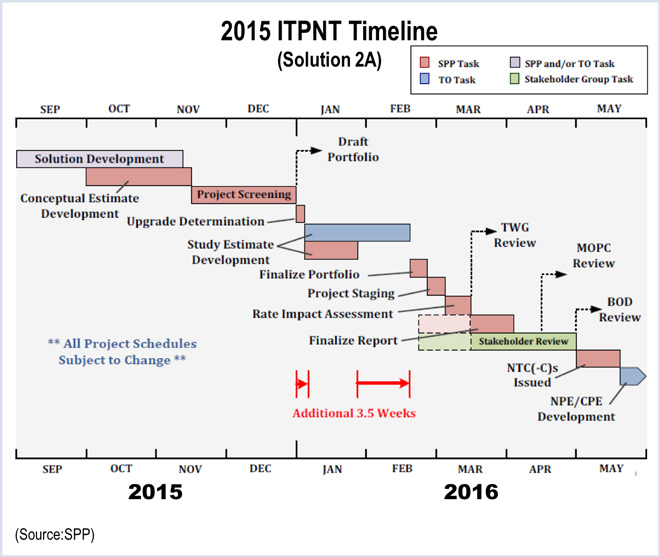KANSAS CITY — SPP’s Strategic Planning Committee on Thursday endorsed a plan to make incumbent transmission owners responsible for providing cost estimates for non-competitive projects.
The plan recommended by the Competitive Transmission Process Task Force — Solution 2A — easily cleared the Markets and Operations Policy Committee earlier last week. It adds additional cost analysis of competitive-projects by transmission owners. SPP and third-party vendors would still evaluate competitive projects subject to Federal Energy Regulatory Commission Order 1000.
Although the overall timeline remains the same, Solution 2A adds three and a half weeks of study development, allowing for a better cost analysis, said Xcel Energy’s Bill Grant, the task force’s chair.
“For the projects that have been identified as non-competitive, we will receive the estimate from the transmission owner instead of the third-party vendor,” Grant said. “At this point in time, the project has already been selected. We’re just proving the estimate is non-competitive.”
Carl Monroe, SPP’s executive vice president and COO, said the additional screening “improves the estimating process, so we can give the [SPP] board better information” for selecting projects to build.
Because the process change could require revisions to the Tariff and governing documents, FERC approval will likely be required, along with the normal SPP approval process.
Load Responsibility White Paper
Golden Spread Electric Cooperative’s Mike Wise updated the SPC on the Capacity Margin Task Force’s Load Response Entity (LRE) white paper, which cleared the MOPC earlier in the week. The document is intended to ensure all load served by SPP’s balancing authority has sufficient capacity.
“If an entity is not responsible for a load forecast or contract,” Grant asked during the MOPC discussion, “should the customer be an LRE?”
“The first and most critical step is to make everyone adhere to the policy,” said Richard Ross of American Electric Power. “Secondly, we need to transfer the responsibility obligation to those with wholesale contracts. … It’s not my responsibility as a legacy BA.”
Developing a policy to enforce the requirement will take additional time, Wise said.
The task force asked that its charter be extended for an additional year to July 2016, a request approved by the MOPC and endorsed by the SPC.
Wise told the SPC that SPP staff is developing a deliverability study process that will allow for non-firm transmission service for planning reserves. The study will analyze all generators registered in the Integrated Marketplace and determine whether they are deliverable to all loads within the SPP balancing authority.
Engaging Prospective Members
The SPC also reviewed the final report from its Task Force on New Members and approved a recommendation to improve the process of engaging prospective transmission-owning and load-serving members.
The task force was commissioned in 2014 to develop formal processes to be followed during negotiations with prospective members.
Michael Desselle, SPP’s Chief Compliance and Chief Administrative Officer, said much of the task force’s work centered on how to involve the regulators on SPP’s Regional State Committee during the negotiation period. The task force tried to balance transparency with the need for confidential negotiations.
The report notes that SPP staff “remains solely responsible for the direct negotiations with the prospective member,” while stakeholders provide input on policy and changes to the governing documents.
The SPC discussed the legal costs for smaller entities and the threshold for “triggering events” when a prospective new transmission-owning member formally requests changes to SPP’s Tariff and governing documents or RSC bylaws.
The committee also considered the report’s definition of stakeholders: “Stakeholders include existing transmission owner members, transmission-using members and RSC members and their staffs.”
“Stakeholder means anybody and everybody in the world who feels affected in some way,” said SPP board member Phyllis Bernard, urging “SPP” be used as a modifier for “stakeholder” across all governing documents.
The task force will make several language modifications to the report before sending it to the SPP Board of Directors for its approval.
Behind-the-Meter Generation
Wise teed up a discussion on behind-the-meter generation by noting that the amount of such unaccounted-for energy is growing. “I know some market participants are not adding [behind-the-meter generation] back in[to the pool],” Wise said, “and it’s not fair.”
The Regional Tariff Working Group will take up the issue for further discussion during its Thursday meeting.
Integrated System
Monroe told the committee that SPP is continuing to incorporate members of the Integrated System and their facilities under the RTO’s Tariff. He said the majority of the IS load that would be placed under the Tariff has already been accounted for.
Monroe said that while the Northwest Power Pool has suspended its solicitation for bids to manage its energy imbalance service market, SPP continues to consult with the pool on EIS markets.
— Tom Kleckner




